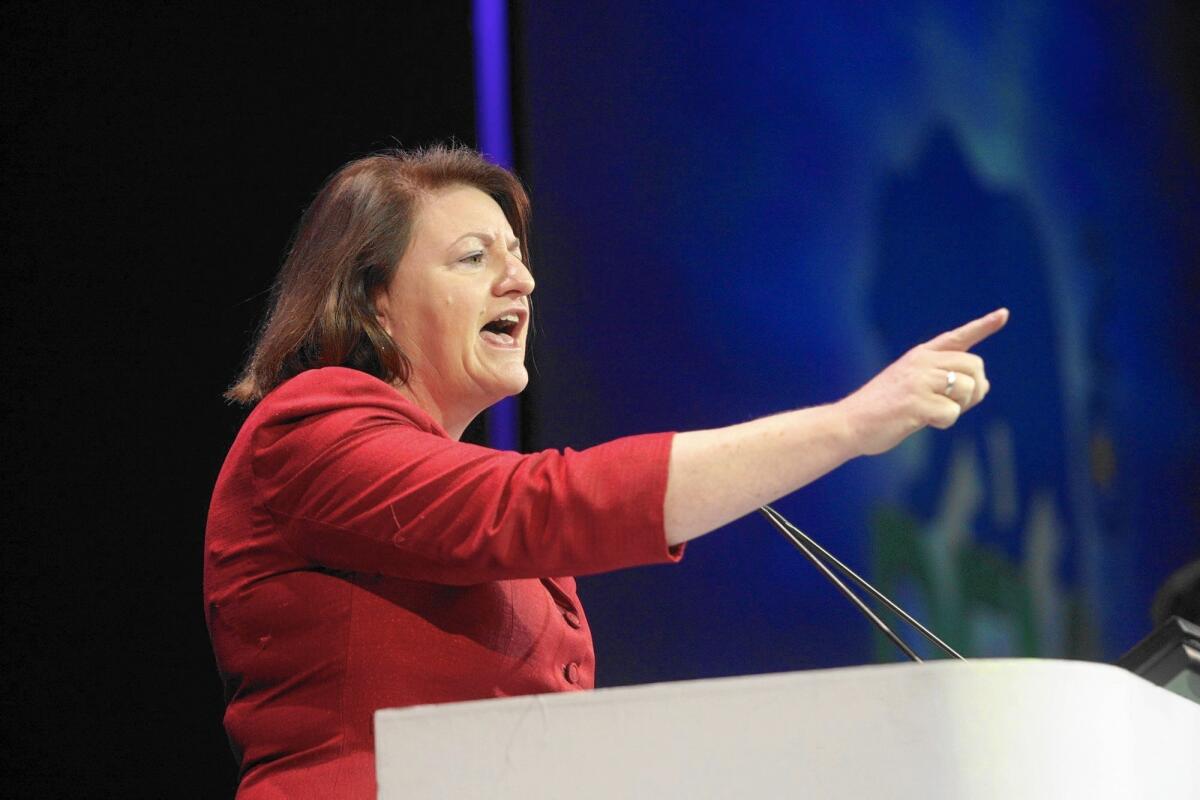Capitol Journal: UC tuition hike earns a failing grade

- Share via
in sacramento — It’s just common sense: If you’re trying to grab more money from university students and their parents, you should not be dramatically raising the pay of top brass.
That’s just dumb PR, losing politics and really bad policy.
Don’t ask the kids and their families to sacrifice while fattening the pocketbooks of your own already highly compensated chancellors.
That’s not fair to people in the real world of stressed taxpayers and parents struggling to pay their kids’ tuition.
It’s why the people’s elected representatives — starting with the governor — are up in arms about the University of California’s latest tone-deaf play to jack up some executives’ pay while squeezing more money out of students.
“It’s a hard pill to swallow,” says state Assembly Speaker Toni Atkins (D-San Diego).
Atkins’ legislative leadership gives her a seat on the UC Board of Regents, which has sole power to increase tuition and is scheduled to consider doing that Wednesday in San Francisco. She’ll vote no.
More important, Atkins is one of the two most powerful members of the Legislature, which controls the flow of Sacramento money to UC. If things really get nasty, the Legislature could reduce the university’s allowance by every buck it raised from increased tuition, canceling it out. But nobody’s threatening that yet.
“This shouldn’t be ‘High Noon,’” says new Senate President Pro Tem Kevin de León (D-Los Angeles). “Reasonable minds can come together so students are not hurt.”
You’d think. But that hasn’t always happened in the Capitol. So UC undergraduate tuition today is more than eight times what it was 25 years ago, at $12,192. Tack on campus fees, books, room, board and other stuff and you’re up to $33,000 a year.
Cal State tuition has been rising too, but is still a lot less than at UC — $5,472, about eight times what it was 25 years ago. CSU isn’t planning on boosting tuition, per se. But eight campuses have imposed what’s laughingly called student success fees, which is tuition by another name. They range up to nearly $800.
But it’s the more prestigious UC that really seems to be on another planet.
Two months ago, the UC regents gave pay hikes of up to 20% to the leaders of the Santa Barbara, Santa Cruz, Merced and Riverside campuses and awarded the new Irvine chancellor 24% more than his predecessor. We’re talking salaries ranging from $383,000 to $485,000, plus perks.
And it goes deeper than chancellor. Last year, for example, UC Davis hired a PR person at a $260,000 annual salary.
The California governor earns $177,466. The UC president makes $570,000. The U.S. president: $400,000.
We’re always hearing that the public has to pay lavishly for university honchos because of competition for their services from private colleges and other states’ institutions. Our calm climate, balmy beaches and majestic mountains aren’t nearly enough. But that’s a common theme heard throughout public employment, from drafting rooms to firehouses.
We also routinely hear that Californians should be thankful; tuitions in other states are even higher. So what? College affordability is one of the assets that made California great.
“At the core of the DNA code for California,” historian Kevin Starr, a fourth-generation native son, once told me, “was the idea that this state could be better for ordinary Americans. That included access to higher education, [which] had been only for the wealthy. We broadened life in many ways.”
These days we’re burdening lives with hefty student loans.
The day after the Nov. 4 election, UC President Janet Napolitano—a former Arizona governor and U.S. secretary of Homeland Security — stunned many by proposing tuition hikes of up to 5% in each of the next five years. By 2019, tuition could reach $15,564.
She said UC needs more money to pay for recent pay increases, including employee contract settlements, and help cover rising costs of retirement benefits.
Hello! There was a 20-year period, 1990 to 2010, when neither UC nor its employees contributed to their retirement system. Now students are supposed to help pay for the university’s long pension holiday?
Napolitano said UC also wants to hire more faculty and admit more students.
Here’s another thing that rankles: UC officials note that only about 30% of undergrads from California pay full tuition. The rest receive some financial aid. And half pay nothing. Well, good for them.
But those 30% full-payers are forking out more money to help the other 70%. If that’s state policy, all state taxpayers should be footing the bill.
Under Napolitano’s plan, a third of the new tuition would be earmarked for financial aid.
De León is calling for a big increase in tuitions paid by out-of-state residents. But they’re already paying triple what Californians are. We shouldn’t be leaning so heavily on out-of-staters anyway. They take up slots that should be reserved for Californians. Roughly 20% of the students at Berkeley and UCLA are non-residents.
The governor, who’s a regent, opposes Napolitano’s proposed tuition hike. He has promised to increase state funding for UC by 4% each year during the next two if tuition doesn’t rise. He has hiked it 5% each of the last two under a tuition freeze.
Napolitano says that deal’s not good enough.
Sacramento agrees the university may need more money. The state General Fund now provides roughly $3 billion, 43% of UC education costs. But it first needs to be more efficient — and a lot less generous with taxpayers’ dollars.
UC needs to stop pick-pocketing the students.
More to Read
Sign up for Essential California
The most important California stories and recommendations in your inbox every morning.
You may occasionally receive promotional content from the Los Angeles Times.











